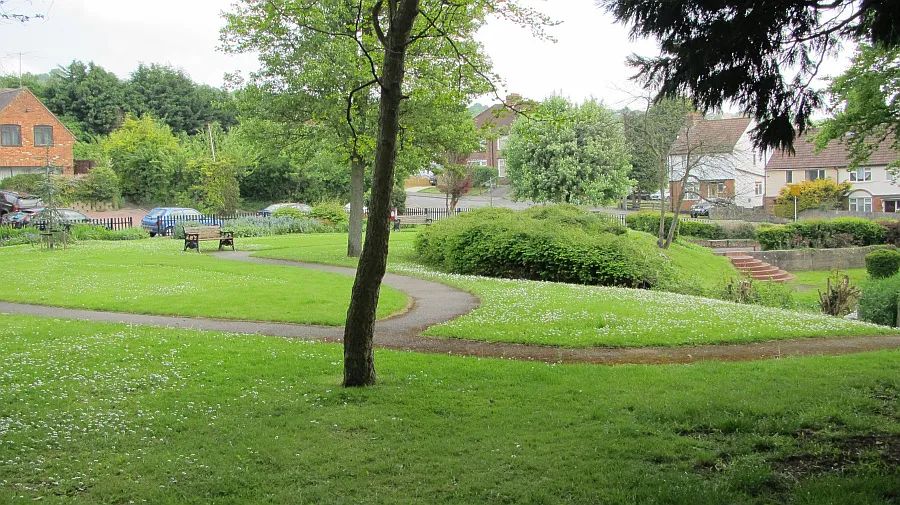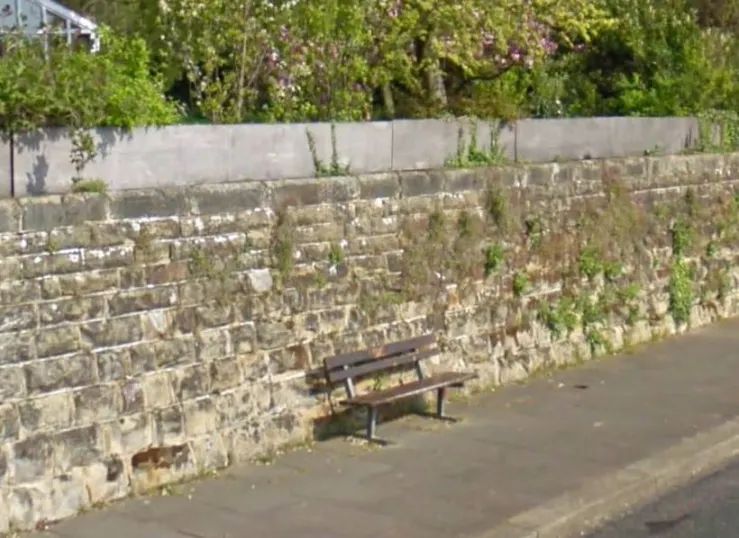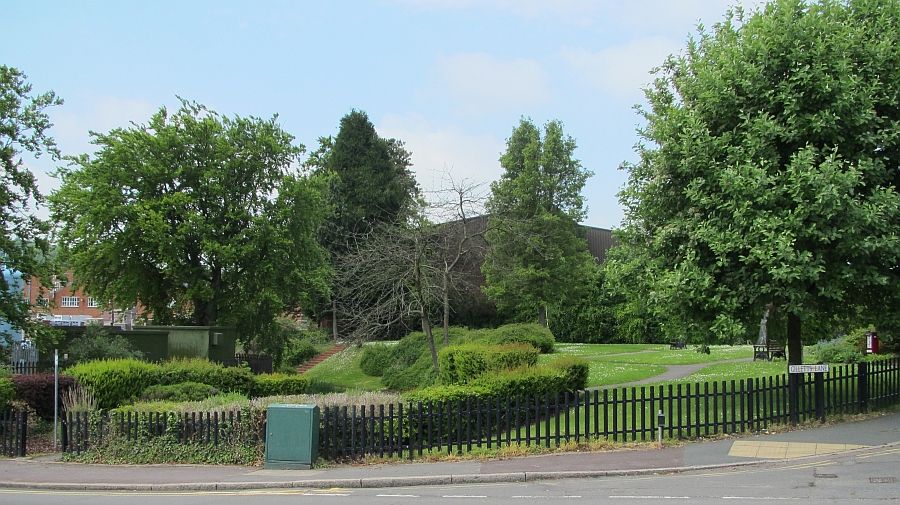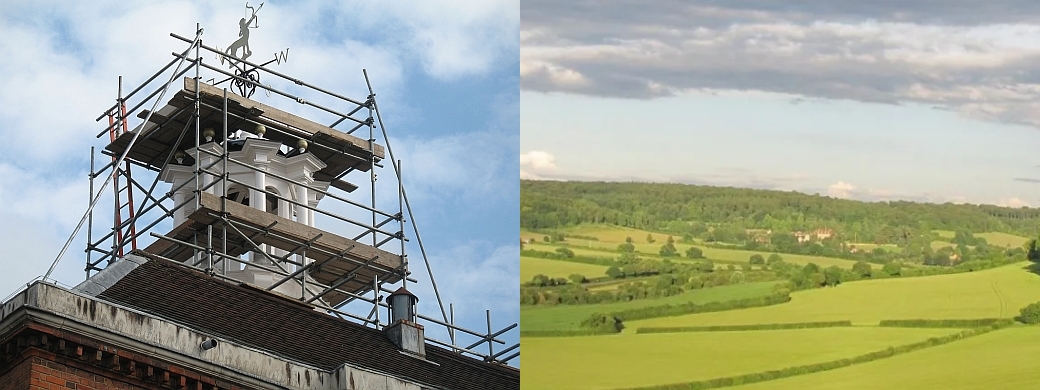 I often pass this public garden, fifteen minutes’ walk from home going west along the valley. It has three benches, normally unoccupied, and I’m always tempted to sit on one, and be part of the scenery. It’s as if I have a romantic notion of park benches. There’s a nice film about shenanigans on Hampstead Heath which could induce such a notion, but for me it undoubtedly goes back to a particular bench opposite the house my mother lived in the Seventies. On more than one occasion, when I went to visit her, there would be three old men sitting there in a row. Sometimes they’d roar with laughter; other times one or other would talk, to a rapt audience; and then all three might fall silent at once, each in his own thoughts. This rendezvous seemed the high spot in their lives. For all I know, each had shuffled or limped there, to share talk of old times, or the state of the world now. Not many moments stay with one over the years, but these are amongst the unfaded snapshots in my album of memory; part of a gallery through which I interpret the present. In imagination, that bench was rather grand, a worthy place of pilgrimage for Three Kings of no agenda, three survivors from an earlier age. So I’m shocked to revisit the spot via Google Street View, and see how banal and mean it looks.
I often pass this public garden, fifteen minutes’ walk from home going west along the valley. It has three benches, normally unoccupied, and I’m always tempted to sit on one, and be part of the scenery. It’s as if I have a romantic notion of park benches. There’s a nice film about shenanigans on Hampstead Heath which could induce such a notion, but for me it undoubtedly goes back to a particular bench opposite the house my mother lived in the Seventies. On more than one occasion, when I went to visit her, there would be three old men sitting there in a row. Sometimes they’d roar with laughter; other times one or other would talk, to a rapt audience; and then all three might fall silent at once, each in his own thoughts. This rendezvous seemed the high spot in their lives. For all I know, each had shuffled or limped there, to share talk of old times, or the state of the world now. Not many moments stay with one over the years, but these are amongst the unfaded snapshots in my album of memory; part of a gallery through which I interpret the present. In imagination, that bench was rather grand, a worthy place of pilgrimage for Three Kings of no agenda, three survivors from an earlier age. So I’m shocked to revisit the spot via Google Street View, and see how banal and mean it looks.
So here I am today, sitting on another bench in this nameless* public garden, on a rare day that’s warm enough. All is deserted, till two lovers come strolling through. They glance quickly and take the other path to the more secluded bench (at the right, at the top of the semi-circular steps). So it’s just you and me, dear reader, via these scribbles in this little notebook, whilst I’m still able; & perhaps before my best days are entirely over. Contentment is a wonderful blessing, but it means you have less to say. How about a companionable silence, a shared reverie? I don’t see why that cannot be achieved with the written word, somehow. As I like my life more, I find less and less need to agonize and analyse. Let thoughts go where they will, like bees bumbling amongst the blossoms.

Are not grace and dignity the greatest virtues now? For the old, certainly. You may not be elderly yourself, dear reader, but join me anyway, in flights of imagination, so we may sit on this bench together. We see the state of the world, we have our views, but can we change it? “Be the change you wish to see in the world,” says Gandhi. Sitting on a bench, all I can do is be. I shall not chant and march, I shall not write to my MP or petition the Government. I take the other ethical values for granted, but let’s talk about grace and dignity. In all these dreadful news items you can clearly see how these prime virtues have been squandered for some base advantage, some spurious principle of gain. Things are done which no right-minded person would do; and why? It was written in a holy book, or they were emboldened by birds of the same feather who enjoy some violent pornography, or dream of Paradise in the hereafter, or a worldwide caliphate. The biggest antidote to dignity and grace is craven fear. Ordinary fear is healthy: it makes us careful and cunning in self-preservation. Craven means “Vanquished, defeated; or, perhaps, confessing himself vanquished.” Big difference. What makes us craven? An impoverished horizon, an inner emptiness where there should be self-assurance. And then in the worst cases it leads to disturbing phenomena, heinous actions done by one man from what seems like a kind of madness, yet technically isn’t insanity, actions which create vast distress, and an indelible stain on a place, a moment, the souls of those most directly affected and everyone else—almost everyone else—in sympathy.
There are malign influences in the world, like sources of infection. Some of us have a well-developed immune system: a solid set of ethical values, based on a sense of universal oneness. And for this it is necessary to have a knowledge of love: not just this or that person or experience, but a sense of it being eternally embodied in the real. And with this knowledge of ethics and love, we may lose our bearings, but always we retain a compass, so that we cannot get seriously lost. Common sense in all its reassuring solidity remains within our reach.
But even so, we ask ourselves the perennial question, “Why am I here?” so that our day may be sustained with a sense of purpose. Over these seven years of blogging, which chart seven years of thinking—for writing is a wonderful aid to thinking, takes us places we could never reach from within an oral culture, or personal illiteracy—I’ve found an answer to that question. It’s a very simple one and I think it has a supreme generality. It applies to all of us, and I think it’s a principle of the universe, within which the human being is an exceptional creature, or so we like to think. My answer is not entirely new, for I’ve thought it before over these seven years and can probably trace the thought through the pages of this blog. But it’s only as I write now, sitting on this bench in the corner of an intersection, with traffic passing on two sides and birds singing joyfully from the trees all around, that I see it in such clarity. The whole spiritual quest, for God, his holy angels and only begotten son, or any other way you want to put it, can be expressed in two words: giving and receiving.

It’s been drummed into us, perhaps, that it’s “more blessed to give than to receive”. This notion comes only from Paul, who says that Jesus said so, though he had never been in Jesus’ presence. I think everyone who has ever repeated it has done so with ulterior motives.
I have shewed you all things, how that so labouring ye ought to support the weak, and to remember the words of the Lord Jesus, how he said, “’Tis more blessed to give than receive.”
And when he had thus spoken, he kneeled down, and prayed with them all. And they all wept sore, and fell on Paul’s neck, and kissed him, sorrowing most of all for the words which he spoke, that they should see his face no more. And they accompanied him to the ship. [Paul’s farewell speech to the disciples in Ephesus, Acts 20:35-36.]
I don’t feel bound by any holy book, and in my perception receiving is the primary and greater blessing. It starts with mother’s milk and parental love. Only when we have received enough do we spontaneously feel the urge to give back. Receiving is also purer, for in giving, the temptation is to do good according to some formulaic concept, in other words to interfere. The purity of receiving takes place in the simple movement of the heart we call gratitude.
The entire World can be improved, through doing by non-action. If you want to take action, you are not qualified to change the World. [From Tao te Ching, chapter 48.]

Giving and receiving is not to be confused with what happens in trade. Vast expanses of our lives are taken up with trade: carefully matching quantity delivered with quantity paid. We can distinguish the difference perfectly well. We know that it’s ignoble to expect a return for what we give to friends and loved ones; or to feel a burden of debt when we feel moved by what they give to us. What is ignoble? That which lacks dignity and grace. These are just my ideas, begotten in this fertile sunshine, offered as opinions from this park bench.
Blessings need no transcendent God to withhold them or hand them out as prizes. Blessedness is the consequence of being in harmony with the All. The universe operates dynamically through the interdependence and mutual influence of its parts. There is no gap remaining to be filled. I’m not sure we should be enslaved to agenda. One doesn’t have to be old to see this. One can take time out, sit on a park bench, watch the world go by, flow in harmony with the imperatives which make themselves known.
———–
* Nameless park: I looked it up later on the Web, found a reference on the municipal website:
“Gilletts Lane is a small open space situated between Chapel Lane and Mill End Road. The area is managed as a small ornamental garden, which displays flowerbeds throughout the year. The River Wye also runs through this open space.”

Ah, quite a lot to digest, as usual. That must be some park bench!
As for it being “more blessed to give than to receive”, I feel like if Nietzche were here he would counter then that it follows that “He who receives is a fountain of blessings.”
LikeLike
Excellent! Google says:
No results found for “He who receives is a fountain of blessings”.
This will soon change, and your channelling of Nietzsche's thought from the grave will be available to the world.
I was going to add a pagan comment by Ezra Pound, not channelled this time but a well-known poem, which stuck with me from the moment I first read it:
Phyllidula is scrawny but amorous,
Thus have the gods awarded her,
That in pleasure she receives more than she can give;
If she does not count this blessed
Let her change her religion.
LikeLike
” The Prayer of Saint Francis
Lord, make me an instrument of thy peace.
Where there is hatred, let me sow love;
Where there is injury, pardon;
Where there is doubt, faith;
Where there is despair, hope;
Where there is darkness, light;
Where there is sadness, joy.
O divine Master, grant that I may not so much seek
To be consoled as to console,
To be understood as to understand,
To be loved as to love;
For it is in giving that we receive;
It is in pardoning that we are pardoned;
It is in dying to self that we are born to eternal life.”
The coin has 2 sides. We flip it over to see the other side.
LikeLike
Thanks, Ellie. I was very interested in St Francis at one time. A number of his prayers and other writings have been preserved since the 13th century, but the “Prayer of St Francis” isn’t one of them. It didn’t see daylight till 1912, written in French. I see that it was introduced to the United States in a Quaker publication. I remember it from church–it was also set to music–but it is best known England for being quoted by Margaret Thatcher on the day she became Prime Minister.
As far as it relates to my post, I take it to be a riposte, putting forth the other side of the coin, Christian action rather than Taoist non-action.
I’m very pleased you commented, Ellie, and look forward to more on my next, which may pick up a background thread in the above post and propose something radical: unilateral religious disarmament, as a way to isolate and render absurd all kinds of fundamentalism (some of which kinds are doing immense damage in the world).
LikeLike
“unilateral religious disarmament” is a fantastic idea, Vincent! Humorous and serious at the same time.
LikeLike
Well said Vincent. I must find my park bench, and the time to reflect.
LikeLike
I am surprised to learn that the the prayer was not written by St Francis because I have found it attributed to him in so many sources. The sentiments in it are consistent with his character. The prayer however is widely accepted because of the truth it communicates. While reading your post I thought of the line in it, 'For it is in giving that we receive.'
I don't see the prayer as desiring action but seeking inner change. Self-awareness promotes the serenity of letting go of all that prevents the fulness of life.
LikeLike
Ellie, this too is excellent. I started to write a comment in response, but it grew and grew. Then I realized it was my next post starting to take shape.
Indeed the prayer is widely accepted and has been publicly quoted by a variety of “movers and shakers”. My critique is too extensive to appear in a comment.
It's not important, perhaps, but I didn't quite see the prayer as consistent with other writings by St Francis, as available on the web here.
There, when he refers to receiving, the gift is most often “the most sacred Body and Blood of the Lord”, or some such. And when he refers to giving, he means “alms because they wash souls from the foulness of sin”, or praise and thanks to the Lord.
His notion of the spiritual life, in short, seems to be very different from that expressed in the Prayer of St Francis.
Apart from his “Canticle of the Sun”, I think few people know anything else of his writings, and probably extrapolate their sense of who he was largely from the misattributed poem.
For myself, I first got interested in him first from Franco Zeffirelli's film, “Brother Sun, Sister Moon”–enjoyable in itself and based on certain historical facts, but not a reliable witness to the man himself.
LikeLike
Dear lost city journals, or may I call you Brian? Yes, humorous and yet serious. I'm working on it.
Charles, would you say that it's easier to find the park bench, or easier to find the time to reflect? For myself, I'd say that neither of these are any problem, once you feel the inner call. I suppose I was saying that the park bench and my blog have become somehow welded together, as a place for informal public discourse on whatever strikes our fancy.
Which prompts me to ask you: what's happened to your own blogging presence? Have you migrated to Facebook or Twitter?
LikeLike
You know more about St Francis than I do. I sing the Hymn as it appears in the Methodist Hymnal (http://www.hymnsite.com/lyrics/umh062.sht).
I've seen the movie more than once and would enjoy seeing it again. I especially liked Alec Guinness' role as the pope.
Other than that I've heard of his gentleness, inclusiveness, poverty and compassion.
I look forward to your next post.
LikeLike
Back to posting under my actual name (I've been tinkering with my blog the last few weeks, changing this & that).
A park bench is a holy thing: they have different characteristics, personalities, qualities. And they must have soaked up all of the dreams and visions of their occupiers—that's why the oldest benches are the best. Scrawled in one of my early journals was the phrase “Park Bench Hymnals”— perhaps an interesting title for something.
I miss Washington Square Park—that was my base of operations for many years: Some of those ancient benches were marvelous…
Now I write/meditate/reflect almost exclusively at a (wooden) table in my local coffee shop—it's not a bad place for such things actually.
Splendid post, Vincent.
LikeLike
Blake's Park Bench.
http://www.britishmuseum.org/research/collection_online/collection_object_details/collection_image_gallery.aspx?assetId=413558&objectId=1346600&partId=1
LikeLike
Thanks very much, Ellie, very nice. For once I have a present for you in return: a literary quiz on the theme of William Blake that I heard on the radio yesterday. The BBC offers a “listen again” feature on selected programmes, so you can hear it too, if you click on this link by Saturday. There are questions about Blake, none of them hard, and at the end the team each recite their own pastiches in the style of the Innocence and Experience collections.
LikeLike
Thanks, Brian. Serendipitously, two comments in a row referring to hymnals!
On the topic of the park bench being a holy thing, have you read the books of Carlos Castaneda? I remember some strange dream-like rendezvous there, with Don Juan or Don Genaro. See for example http://terebess.hu/english/fire6.html which quotes maybe the extract I'm thinking of, and while we are at it and continuing our discussions on lucid dreaming, this: http://en.wikipedia.org/wiki/The_Art_of_Dreaming.
LikeLike
The radio program is a generous gift. I think there are many Blake lovers in Britain as well as many Blake scholars. I think Blake may have experienced an inflation if he had known how much he would be loved and studied.
“When the ego can distinguish what belongs to itself from what belongs to the objective or transpersonal unconscious psyche, it will be free of inflation (Jung, 1951).” Encyclopedia of Psychology and Religion: L-Z
LikeLike
Even William Blake had a park bench!? I gotta get one of these things. The closest I've got at the moment is a patio set with carpenter bees buzzing around it.
And Vincent, would you believe that I have all of those Castaneda books? Brilliant and fascinating stuff, even if it is most likely a load of bollocks, or however you folks say it across the drink there. Some people get all worked up over the idea that he made Don Juan and all that stuff up, but I say, who cares? I prefer that he made it all up. That just tells me that he's a prolific fiction writer with one hell of an imagination.
LikeLike
Bryan, the main point about a park bench is to be in a public park.
I'm glad to hear you have all the Castaneda books. You beat me on that one. I discover two on my shelves & didn't even know that I had them–charity shop purchases no doubt, though I've devoured them in the past. I'd put them in the same class as the tales from your Encyclopedia of Counted Sheep, except that they were inspired by psychedelic drugs and the conjuring tricks of Toltec sorcerors, rather than sleep.
Castaneda is interesting to compare with a more earnest book in the same Toltec tradition and “personal growth/self-help” genre: The Four Agreements, by Don Miguel Ruiz. The first agreement is “Be impeccable with your word.”
Quote: “Depending on how it is used, the word can set you free, or it can enslave you even more than you know. All the magic you possess is based on your word. Your word is pure magic, and misuse of your word is black magic.”
Doubtless bollocks, but entertaining in its way.
On the comparison between your Counted Sheep and Castaneda's unreliable memoirs, I'd say what they have in common is this, that every remembered dream is glued together with conscious embellishment; and go further to assert that conscious embellishment and remembering the dream are synonymous.
LikeLike
Favorite quote:
“The basic difference between an ordinary man and a warrior is that a warrior takes everything as a challenge while an ordinary man takes everything as a blessing or a curse.”
― Carlos Castaneda
LikeLike
Yeah, I could see the connection. In both cases it's a realm where the idea is more important than the fact.
LikeLike
Yes, that sums up the Toltec way, I guess.
I very much like what you and Jung have to say about inflation. I suppose it's what some people seek. Being well-nigh invisible irks them. But it's a nuisance to those of a different temperament, and needs the blessed balm contained in Jung's observation, though they might express it more simply: “To God the glory.”
LikeLike
Bryan, apologies for implying that you couldn't obtain a park bench. In England at any rate you can certainly have one of your own, but not usually in your lifetime. I'll do a little follow-up post to explain.
LikeLike
I read several of Castaneda's books way back in the 1960's—loved them— At the time I thought that they were true accounts of shamanism, but now I'm skeptical.
I think that the real magic and sorcery today is performed by the corporate media—they can certainly make very large numbers of people think and do strange and terrible things! They create and invoke demons to do their bidding and terrify the population—what is this if not a kind of black magic?
LikeLike
“I sat on the bench at the left”'
yer, i know – cherry picking.
Um, that's my first reaction. Am a bit annoyed about many other things which have no link to what you are on about – but mebbe they have.
Self needs to settle thoughts .. yet again.
LikeLike
Left, right, left right – sounds like an army ..
By the right – queeek MARCH!.
erk. Yep, was there, once upon a time. Loved it; kilts, college and uniforms; schoolboy fantasies.
LikeLike
Davoh, if I didn't know you better, I'd be wondering about those schoolboy fantasies, & what's annoying you now … Actually I do wonder anyhow.
May those thoughts settle, and may you be comfortable with them, or without.
LikeLike
Brian, it may be a kind of black magic, but like any form of magic it exploits what;s already there in most human beings–for example gregariousness. Which I define as the notion that when you're outnumbered, whatever the others agree on must be right. Because it's more important to be in the group than true to yourself. That's how the corporate media works–by defining the news, the bestsellers and what people think.
Am I right?
LikeLike
Yes, I think that is right. Group-think and a herd mentality is certainly encouraged. And if all the newspapers, news programs, and movies are all telling us that we must invade “Country X”, because “Dictator Y” is the most evil man since Hitler, who can resist this spell? I think above all it's about fear: tell the people that someone is attacking them and they will gladly surrender all their rights in exchange for an imagined safety.
LikeLike
Yes, but I'm not sure if this is the same thing. I mean there really are terrorist plots. Perhaps we may have to surrender certain rights so that intelligence services may diminish our perfectly rational fear of being blown up, by uncovering plots in time.
And I'm not sure that being able to send an email at all, whether intercepted or not, is really a right. It's just a convenience we've got used to.
I feel I shouldn't be saying this – it's too close to talking politics!
LikeLike